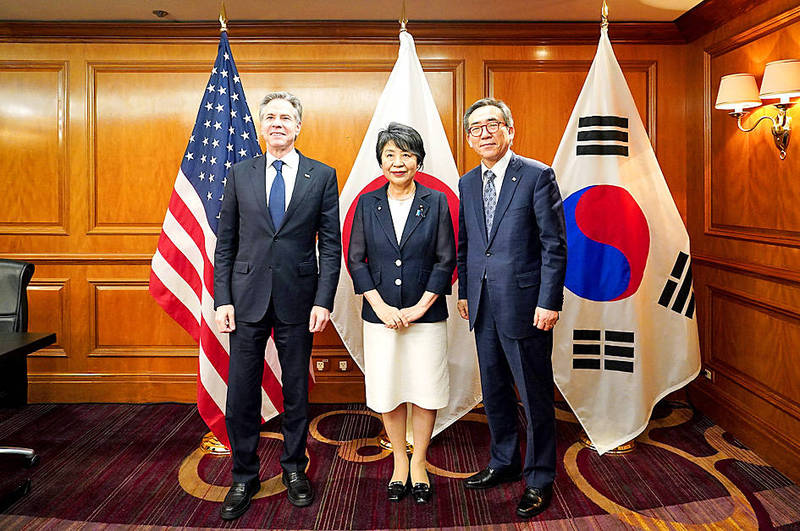《TAIPEI TIMES》Cross-strait stability highlighted at G20

From left, US Secretary of State Antony Blinken, Japanese Minister of Foreign Affairs Yoko Kamikawa and South Korean Minister of Foreign Affairs Cho Tae-yul pose for a photograph during a trilateral meeting on the margins of the G20 Foreign Ministers Meeting in Rio de Janeiro, Brazil, on Thursday. Photo: EPA-EFE / South Korean Ministry of Foreign Affairs
INTIMIDATION: China’s provocative actions intended to undermine the ‘status quo’ have posed severe challenges to regional security, the Ministry of Foreign Affairs said
By Liu Tzu-hsuan / Staff reporter
The Ministry of Foreign Affairs yesterday expressed gratitude to the US, Japan and South Korea for their continuous attention to issues across the Taiwan Strait, and their efforts to maintain cross-strait peace and stability.
US Secretary of State Antony Blinken, Japanese Minister of Foreign Affairs Yoko Kamikawa and South Korean Minister of Foreign Affairs Cho Tae-yul “discussed efforts to maintain peace and stability across the Taiwan Strait” on the sidelines of the G20 Foreign Ministers Meeting in Rio de Janeiro, Brazil, on Thursday, US Department of State spokesman Mathew Miller said.
The three leaders also exchanged views on “ongoing and future efforts to support one another’s respective Indo-Pacific strategies,” as well as North Korea’s provocative behaviors and the conflict in Gaza during the trilateral meeting, Miller said.
In Taipei, the ministry welcomed the discussion by the three heads of foreign affairs based on the collective stance their leaders adopted at a historic summit at Camp David, Maryland, in August last year.
US President Joe Biden, Japanese Prime Minister Fumio Kishida and South Korean President Yoon Suk-yeol in a post-summit statement reaffirmed “the importance of peace and stability across the Taiwan Strait as an indispensable element of security and prosperity in the international community,” and called for a peaceful resolution of cross-strait issues.
China’s provocative actions intended to undermine the “status quo” across the Taiwan Strait, such as its military intimidation against Taiwan and a unilateral change to flight route M503, have posed severe challenges to regional security and aroused great concern from the international community, the ministry said.
Like-minded nations have reiterated the importance of cross-strait peace and stability during leaders’ summits and multilateral meetings, showing that a strong consensus exists on the issue, it said.
As a responsible member of the international community, Taiwan is to continue working with international partners to safeguard the rules-based international order, and promote regional peace, stability and prosperity, it added.
Separately, President Tsai Ing-wen (蔡英文) yesterday thanked the Japanese government for underlining the importance of cross-strait peace and stability.
Tsai made the remarks during her meeting with Sasakawa Peace Foundation executive director Nobukatsu Kanehara at the Presidential Office in Taipei.
Tsai thanked Kanehara, a senior diplomat, for his support and concern about relations between Taiwan and Japan, and for providing insights on Taiwanese and Japanese affairs in books and at forums.
She also expressed gratitude to the Japanese government for reaffirming the importance of peace and stability across the Taiwan Strait on many occasions.
Taiwan and Japan have always been good friends that support each other, such as overcoming the challenges of the COVID-19 pandemic, and signing agreements to facilitate economic, industrial and cultural exchanges, she said.
Tsai said she hoped to see the two sides continue to expand their cooperation in various fields, and to jointly safeguard democracy and freedom to create a free and open Indo-Pacific region.
新聞來源:TAIPEI TIMES



















